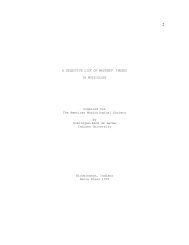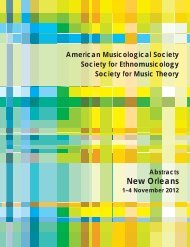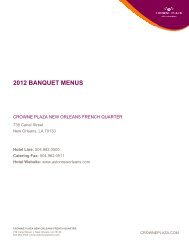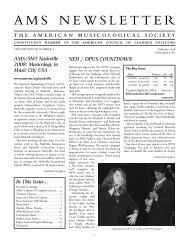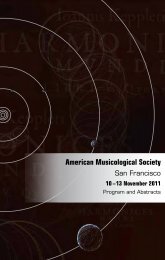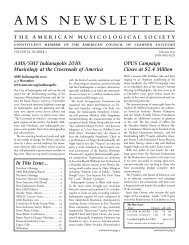AMS Philadelphia 2009 Abstracts - American Musicological Society
AMS Philadelphia 2009 Abstracts - American Musicological Society
AMS Philadelphia 2009 Abstracts - American Musicological Society
Create successful ePaper yourself
Turn your PDF publications into a flip-book with our unique Google optimized e-Paper software.
110 saturday morning <strong>AMS</strong> <strong>Philadelphia</strong> <strong>2009</strong><br />
“STAR ME KITTEN”: WILLIAM S. BURROUGHS’<br />
MUSICAL RECORDINGS, MARLENE DIETRICH, AND<br />
THE AESTHETICS OF HIS DARK AMERICANA<br />
Melissa Ursula Dawn Goldsmith<br />
Nicholls State University<br />
A prominent figure of the New York City beats along with Jack Kerouac and Allen Ginsberg,<br />
William S. Burroughs (1914–97) was best known for his novel Naked Lunch (1959),<br />
one of the most influential works of the twentieth century. Despite the numerous analytical<br />
studies of Burroughs, literary and music scholars tend to ignore his recordings with music.<br />
William S. Burroughs at the Front: Critical reception, 1959–1989 (published in 1991) features<br />
notable writers John Ciardi, Edith Sitwell, and James Grauerholz, none of whom discuss the<br />
recordings. The critical introduction to Naked Lunch: The restored text (2001) focuses only on<br />
history, reception, and writing techniques. This presentation will fill the gap by exploring the<br />
musical dimension of Burroughs’ recordings. Although Burroughs rarely mentioned music in<br />
his writing, even though he recorded throughout his career with music, his recordings offer a<br />
glimpse into his influences, aesthetics, and creative processes.<br />
In 1992 Burroughs recorded R.E.M.’s “Star Me Kitten” as a studio outtake for the CD<br />
Automatic for the People. He prefaced this performance by explaining that it “evolved from”<br />
Marlene Dietrich and her version of “Lili Marleen,” Norbert Schultze’s tragic song about a soldier<br />
haunted by his lost love. Burroughs’ recording could be perceived as a tribute to Dietrich,<br />
who died five months before the album’s release, or as a tribute to her performing “Lili Marleen”<br />
near enemy lines after the song was banned in Germany. Having traveled to Europe just<br />
after the Weimar Era and having enlisted in the army in 1942 (bearing in mind the bombing<br />
of Pearl Harbor), Burroughs would have been familiar with the performance.<br />
In 1996 his performance of “Star Me Kitten” was included on the x Files compilation Songs<br />
in the Key of x. Its inclusion seems appropriate not because it was in any x Files television<br />
episode or film footage, but because of the spirit of the beat writer’s eerie performance, as well<br />
as his well known writings for the space age, his distrust of the government, and his belief in<br />
a magical universe. In his recording, Burroughs makes R.E.M.’s song his own through “doing<br />
his thing”: combining beat, expressionist, and ethereal aesthetics.<br />
In contrast to the serious atmosphere of early recordings like Call Me Burroughs (1965) and<br />
Break Through in grey room (recorded in the 1960s and 1970s), Burroughs’ late recordings<br />
like dead City radio (1990), and his performances on Automatic for the People and Stoned<br />
immaculate: The Music of the doors (2000) represent a kitschy reinvention of the elderly beat<br />
writer. The earlier recordings are informed by stark black and white photo covers, somber performances<br />
of Burroughs’ writings, demonstrations of his cut-up technique, experiments with<br />
electroacoustic music, and collaborations with musicians (e.g. Ornette Coleman and Brian<br />
Jones). The later recordings feature color photos, humorously deadpan performances of his<br />
and others’ writings, and singing. Nonetheless, the late recordings, of which “Star Me Kitten”<br />
is truly representative, amount to biographical clues and artifacts of his musicality.



